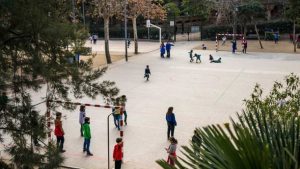Remember growing up in a time when you and your friends would spend entire days outside exploring and playing. Time would float away and your parents would actually have to holler for you to come home for supper.
Outdoor play is vital for childhood, yet with all the new technology and gadgets these days, kids are in danger of sorely missing out on these experiences.
Here are seven profound benefits your kids get from outdoor play.
1. Learning through play
Play (especially free play) and learning are intertwined. Playing outside gives children time to put ideas and thoughts to the test and learn from hands-on experience. Everything around them can provide them specific stimuli that encourage mental growth and understanding. Sights, sounds, and the textures of the world outside can offer them more than you’d imagine. Action and reaction to outdoor games and activities can teach your child the fundamentals of life. We all know how many ‘what if’ and ‘how come’ types of questions children have. Playing outside can help them find their own answers.
2. Improves health
While many parents these days worry about their child being outdoors and getting too much sun exposure, sunshine is actually something we all need. Our bodies need exposure to the sun so that it can turn it into vitamin D. Vitamin D plays a crucial role in our bodies by boosting the immune system and bone development. Kids also need lots of exercise. Children that spend too much of their time with screen-time have a greater risk of developing a weight issue. Playing outside can provide children with the fresh air, sunshine, and physical activity that they need to get healthy and stay healthy. Playing outdoors can also help reduce stress.
3. Allows Kids to be Kids
Being outdoors gives children a sense of freedom to be who they are. They can learn what their limits are by doing physically demanding activities on a jungle gym. How high can I swing? How far can I go on the monkey bars? What happens if I go down the slide backward? While we, as parents, may cringe at some of these notions, they are vital to a child’s personal understanding and growth. They need time to be a child while they still can. Allowing a child to be a child will also help boost their self-esteem and give them confidence.
4. Improves executive functions
Executive functions are the skills we use to help us follow a task from beginning to end. It helps us to plan and prioritize, negotiate, solve problems, and multitask through logic, creativity, and experience. Children can learn to do this through unstructured outdoor play time. Through playing alone outside or with other children, they can learn the skill of using these functions by making up games, trial and error, and simply coming up with ways to amuse themselves.
5. Encourages socialization and interaction
Children that spend all of their time indoors and alone may have a difficult time understanding how to interact with other children and people. While social media and online multi-player games may offer them a hint of this skill, it is not nearly the same thing. Children need to spend time together outside of the home and the electronic world. Face to face interaction can teach them the skills of understanding how others feel and think by observing facial and body cues. Observing the behavior between other children can also help them to learn socialization.
6. Stimulates imagination and creativity
It can be very difficult for a child to be creative and imaginative when they are either stuck in a classroom or sitting in their bedroom watching tv or playing on their computer. Having your child spend some time each day playing outside can do so much to stimulate their imaginative side. It gives them the freedom to come up with ways to entertain themselves instead of them being entertained. Building forts, flying kites, making up games, building sand castles, and other forms of outdoor fun can spark the creative side in your child.
7. Teaches nature and world appreciation
Children come into this world with no knowledge of what their world is and how it works. They need to live it, feel it, and explore it to understand it. Playing outside teaches children every aspect of their environment through simple means. Watching a leaf slowly float down from a tree that also quickly drops an acorn can spark questions about gravity. Inspecting a cocoon that contains an emerging butterfly will bring on a curiosity that can lead to a desire to know more.





